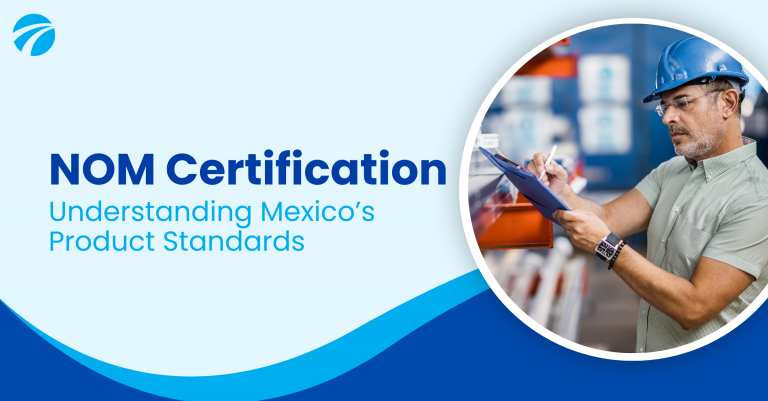If you’re looking to sell products in Mexico, you’ve probably come across the term “NOM Certification.” But what exactly is it, and why is it so important? In this comprehensive guide, we’ll explore NOM Certification, breaking down its purpose, process, and everything you need to know to successfully navigate Mexico’s quality control standards.
What is NOM Certification?

NOM Certification, short for Norma Oficial Mexicana (Official Mexican Standard), is a set of rules and regulations that ensure products sold in Mexico meet specific safety, quality, and performance standards.
It is a mandatory certification for many products sold in Mexico. It’s essentially the Mexican government’s way of ensuring that goods meet specific safety, quality, and performance standards before they hit the market. Think of NOM Certification as Mexico’s stamp of approval. It’s designed to protect consumers, ensure fair competition, and maintain a certain level of quality in the marketplace. For businesses, it’s your ticket to legally selling products in Mexico.
NOM vs. NMX: Understanding the Difference
While we’re on the subject, it’s worth mentioning NMX standards. Unlike NOMs, which are mandatory, NMX (Norma Mexicana) standards are voluntary. They’re more like guidelines or best practices. However, in some cases, an NMX can be referenced within a NOM, effectively making it mandatory. Confusing? Don’t worry, we’ll help you sort it out.
How NOM Certification Works
Now that we’ve covered the basics, let’s break down how the NOM Certification process actually works.
The Step-by-Step Process
- Determine if your product needs NOM Certification
- Identify the specific NOM standard for your product
- Prepare your product and documentation
- Submit your application
- Undergo testing and inspection
- Receive certification and NOM mark
- Maintain compliance
Products Requiring NOM Certification
You might be wondering, “Does my product need NOM certification?”
The answer is: it depends.
Let’s look at some categories.
Consumer Goods
Many everyday items need NOM certification, including:
- Electronics (like TVs, computers, and smartphones)
- Home appliances (refrigerators, washing machines, etc.)
- Toys and children’s products
- Textiles and clothing
- Food and beverages
Industrial Products
It’s not just consumer goods that need certification. Many industrial products also require NOM approval:
- Building materials
- Electrical equipment
- Chemicals and hazardous substances
- Automotive parts
Services
Believe it or not, some services also need NOM certification:
- Telecommunications services
- Energy services
- Environmental services
Exceptions and Special Cases
Some products may be exempt from NOM Certification, such as samples for testing or exhibition.
Additionally, certain products may qualify for simplified certification processes. It’s crucial to research your specific product category to understand the requirements.
How to Get NOM Certified
Getting NOM Certified might seem daunting, but breaking it down into steps can make it more manageable.
Preparing for Certification
Start by thoroughly researching the specific NOM standard that applies to your product. Gather all necessary documentation, including product specifications, test reports, and quality control procedures.
Submitting Your Application
Once you’re prepared, submit your application to an accredited certification body. They’ll review your documentation and guide you through the next steps.
Testing and Inspection
Your product will need to undergo testing at an accredited laboratory to ensure it meets the NOM standards. In some cases, an on-site inspection of your manufacturing facilities may also be required.
Obtaining the NOM Mark
If your product passes all tests and inspections, congratulations! You’ll receive your NOM Certificate and can now use the NOM mark on your product. This mark is your proof of compliance and your key to the Mexican market.
Maintaining Your NOM Certification
Renewal Requirements
NOM Certification isn’t a one-and-done deal. Most certificates need to be renewed periodically, often annually. Mark these dates in your calendar to avoid lapses in certification.
Staying Compliant
Maintaining compliance involves:
- Regular product testing
- Keeping up with changes to NOM standards
- Updating product documentation as needed
Stay proactive to ensure your products remain compliant and your business stays on the right side of Mexican regulations.
Maintaining Your NOM Certification
Tetra Inspection offers end-to-end support throughout the NOM Certification journey. We specialize in guiding businesses through the certification process, helping to avoid common pitfalls and delays.
Our expertise includes but not limited to:
- Identifying applicable NOMs for your products
- Preparing documentation
- Liaising with certification bodies and testing labs
- Troubleshooting issues that arise during the process
In addition, we also previde pre-custom clearance inspection services or Previo en Origen in Mexico.
To learn more about our services, contact us today!

